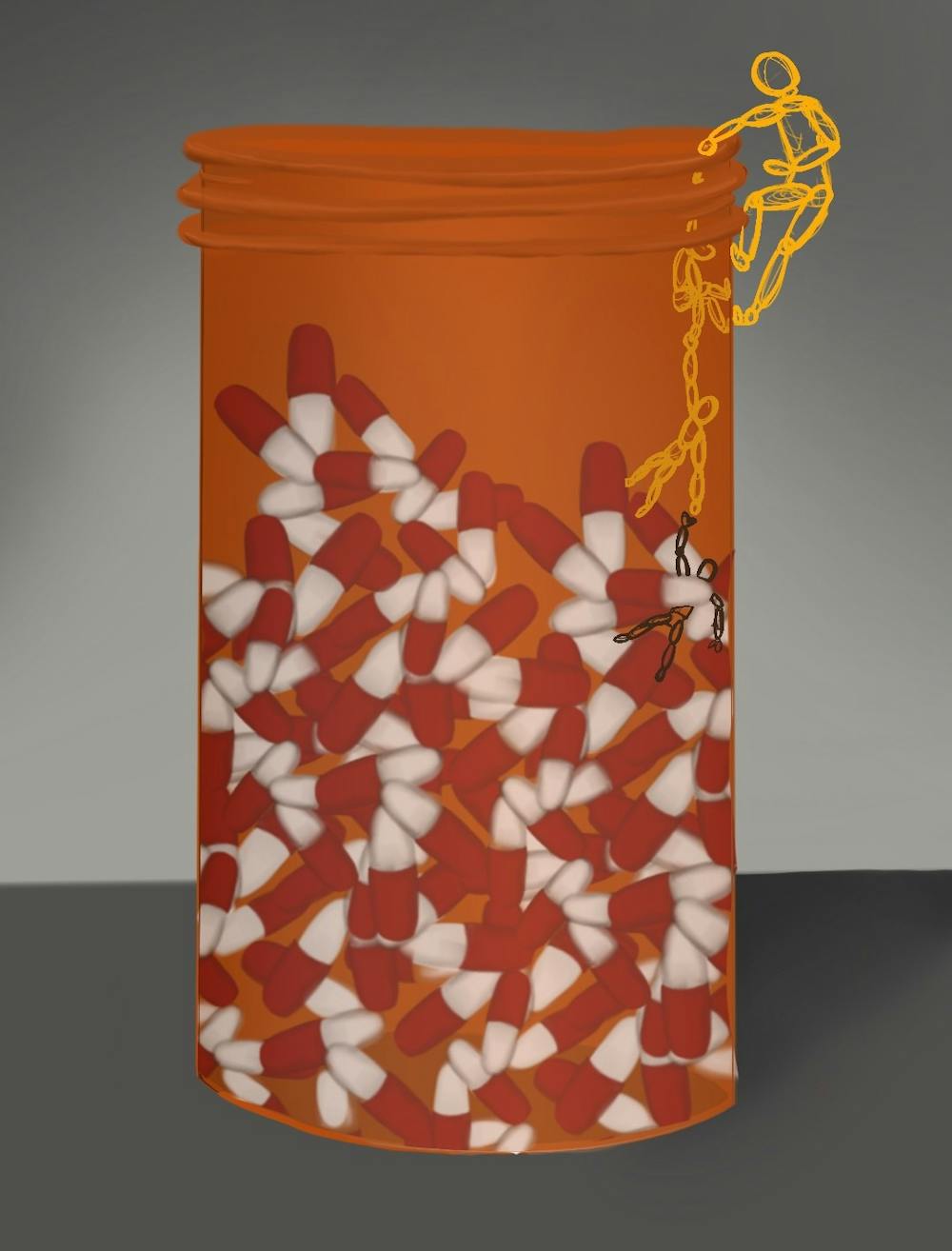The University is participating in new research that helps identify and assist those who are struggling with addiction through its Center for Leading Edge Addiction Research — which develops treatments for addiction.
The number of high school and college aged students — ages 15 to 24 — who died from an overdose increased from 3,377 deaths in 2009 to 4,777 deaths in 2019, per the National Center for Drug Abuse Statistics. According to the NCDAS, the increase in deaths is largely due to opioid overdoses, many of which are caused by fentanyl laced with cocaine. The Addiction Center has found that college students are twice as likely to abuse drugs than those who do not attend a four-year, full-time program.
This substance abuse can come from a number of sources, including stress, increased course load, curiosity and peer pressure. Students involved in Greek life are 26 percent more likely to experience substance abuse than other college students.
CLEAR Director Nassima Ait-Daoud Tiouririne explained the importance of CLEAR and of constant innovation in the field of addiction research.
“I feel it's very important to keep the field rich with new approaches and ways of treating addiction,” Ait-Daoud Tiouririne said. “We really need to lead in testing a new intervention for addiction.”
One of the new approaches that Ait-Daoud Tiouririne has implemented at CLEAR is the opioid helpline, an advertisable and confidential helpline that can be called for a variety of opioid-related questions. She said two main groups of people call the helpline — those who have been prescribed opioids and want advice on how to avoid addiction, and those who are experiencing addiction and are looking for help.
“We really wanted to see and test this platform and see what people — both physicians and individuals — thought about it, and some of what we found was fascinating,” Ait-Daoud Tiouririne said. “And when we collected the data, what was most helpful is having someone to talk to.”
Ait-Daoud Tiouririne said many people experiencing addiction need to talk to someone to orient, educate and connect with them.
First-year College student Anna, who has had a loved one who has suffered from substance abuse, said she came to a similar conclusion. Anna chose to not provide her last name due to privacy concerns.
“Listening is key to helping someone,” Anna said, “I realized that I'm never going to be able to truly understand what it's like, but I still have the responsibility and obligation — as someone who deeply cares about them — to work to reach the best level of understanding possible about their experience.”
With opioid use rising among college students, knowing how to respond to a loved one who is battling addiction is useful. If one is approached by a loved one seeking help with addiction, Ait-Daoud Tiourine said to avoid accusatory language, which is not productive to helping a person as it adds to the stigma surrounding addiction.
Despite the current understanding that addiction is a disease, a lasting stigma still exists surrounding people who are suffering from addiction. When scientists first started studying addiction in the 1930s, they believed it happened to people who lacked willpower. In recent years, however, studies have shown that addiction more closely mirrors brain disease.
“It has a lot of compulsive components that look similar to OCD in so many ways,” Ait-Daoud Tiouririne said. “It changes the brain. It takes control of your brain and becomes compulsive, and you give up everything to maintain that.”
Anna’s personal experiences mirror these trends.
“It was hard at first for me to understand the thought processes behind their decision to continue abusing substances,” Anna said. “Then I finally realized that they weren't making a decision, and that there wasn't a thought process behind it. Addiction is not a choice, and thinking it is doesn't help anyone.”
Another organization working to fight addiction is Addicted.org, a company with a drug treatment center in Charlottesville that is working to aid in the opioid crisis. The company uses a treatment locator service to find a place near the patient that can meet their needs for specific substance abuse issues. The company also publishes information about addiction online.
Writer Joseph Kurtis publishes articles about substance abuse treatments and trends in addiction for Addicted.org. He first started working in the field of addiction in 2011 at a rehabilitation facility and a large part of his work was in the area of patient intake.
Kurtis explained how to react if a loved one is experiencing addiction.
“They're having a tough time,'' Kurtis said. “Their life isn't good. So they don't need someone to come in and tell them all the ways that they're messing up or disappointing. They know that that's the whole reason that they haven't come forward and asked for help.”
Kurtis also explained that the field of addiction and the understanding of addiction has changed over his time in the field.
“When I first kind of got into the field, I thought that there was just treatment,” Kurtis said. “You get treatment and [it] either worked or it didn’t. Turns out that there are many different kinds of treatment.”
An important part of a holistic approach to helping with addiction is having a support team for someone who is struggling with addiction. Ait-Daoud Tiouririne said being heard is an important first step in recovery.
The University offers a number of resources for students who are experiencing addiction or have questions about substance use, including support groups, individual counseling, substance free social events and in some cases, medical intervention. One can contact Student Health and Wellness at 434-924-5362 or visit its Health Promotion & Well-being website page for more information.







